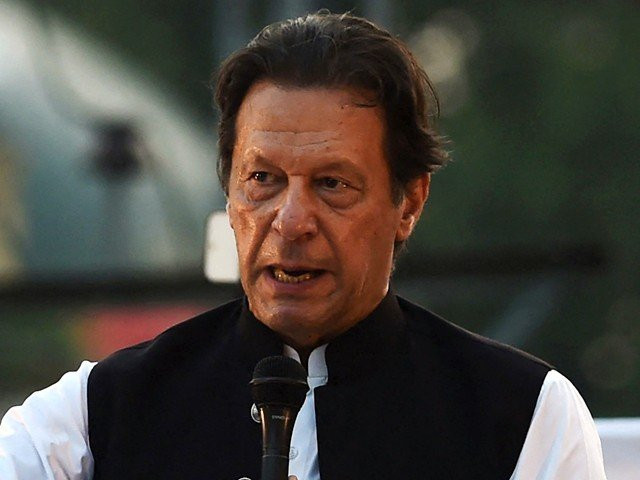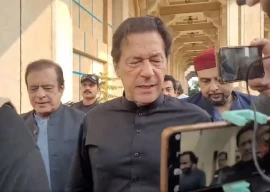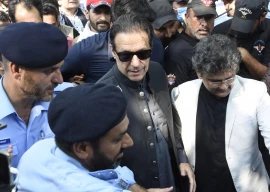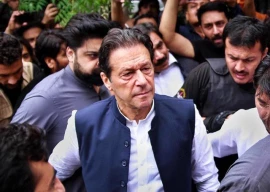
The Election Commission of Pakistan (ECP) is set to announce its verdict in the Toshakhana (gift depository) reference, seeking the disqualification of PTI chairman and former premier Imran Khan on Friday (today).
The election supervisor has issued notices to all the parties for this purpose to be present at its secretariat in Islamabad either personally or through their lawyers.
The main question in the matter is whether a lawmaker could be disqualified on account of concealment of assets in his annual return.
The commission also sought “foolproof security” from the district administration, asking it to deploy police inside and outside its premises for the full day to “avoid any untoward incident”.
The ECP had reserved the verdict in the case on September 19.
Toshakhana – a department under the administrative control of the Cabinet Division – stores precious gifts given to the head of states, MPs, bureaucrats and officials by heads of other governments, states and foreign dignitaries.
According to Toshakhana rules, gifts and other such material received by persons to whom these rules apply shall be reported to the Cabinet Division.
The reference had been moved by the Pakistan Democratic Movement against the PTI chief on August 4 for not “sharing the details” of Toshakhana gifts and proceeds from their alleged sale.
Despite the Pakistan Information Commission (PIC) ordering it to do so, the PTI, while in government, had been reluctant to disclose the details of the gifts presented to Imran since he took over his office in 2018.
It claimed that it would jeopardise international relations.
The reference sought the disqualification of Imran from public office under Articles 62 and 63 of the Constitution.
The reference was sent to the National Assembly speaker, who subsequently forwarded it to Chief Election Commissioner (CEC) Sikander Sultan Raja for further action.
In its hearing on August 29, the ECP had sought a written reply from the PTI chairman by September 8.
In his reply, Imran admitted to having sold at least four presents that he had received during his tenure as the premier.
One of the gifts included a wristwatch, a pair of cuff links, an expensive pen and a ring.
The other three gifts included four Rolex watches.
The PTI chief adopted the stance that he and his wife had received around 58 gifts from August 1, 2018 to December 31, 2021.
Of these gifts, only 14 were such that cost over Rs30,000 and he had purchased them from the Toshakhana while following the due process.
Read more: Toshakhana case: ECP asks SBP for Imran’s bank accounts
According to the reply, four units of the Toshakhana gifts were sold, and they were bought through a payment of Rs21.56 million.
The PTI chief further claimed that more than Rs5.8 million worth of the sold gifts were disclosed in the assets.
During the hearing, PDM lawyer Khalid Ishaq said Imran had also claimed that he had disclosed the income of the sold gifts to the Federal Board of Revenue (FBR), but both statements were separate.
Ishaq added that the objection over the gifts was raised in the Nankana Sahib’s by-election, but then Imran had told the returning officer that the authorised forum to make this decision was the ECP.
“Now they [PTI] are not accepting the authority of the ECP even though the commission can disqualify a member for not disclosing their assets,” the PDM lawyer pointed out.
The ECP noted that there might have been a mistake in declaring the assets and in that case, there was no disqualification.
Ishaq replied that if a mistake was made, it should be admitted. He added that Imran had been found guilty of lying in an affidavit.
The PTI chief’s lawyer, Barrister Ali Zafar, contended that disqualification under Article 62(1)(f) was only the jurisdiction of the judiciary.
He added that the Supreme Court had declared that the ECP was not a court.
He argued that the NA speaker was not authorised to send a reference to the ECP and the commission had nothing to do with where the money came to buy the gifts.
The ECP members told him that if the commission could not do anything, why was a provision in its laws that the NA speaker could send a reference to it.
They added that wherever there was a doubt, the ECP also conducted a thorough scrutiny.
1732090022-0/Elmo-and-Amelia-(1)1732090022-0-405x300.webp)
1725523665-0/Minecraft-Movie-(1)1725523665-0-165x106.webp)

1732089759-0/BeFunky-collage-(75)1732089759-0-165x106.webp)

1732090878-3/Untitled-design-(22)1732090878-3-270x192.webp)

1724268870-0/Supreme-Court-of-Pakistan-(2)1724268870-0-270x192.webp)












COMMENTS
Comments are moderated and generally will be posted if they are on-topic and not abusive.
For more information, please see our Comments FAQ